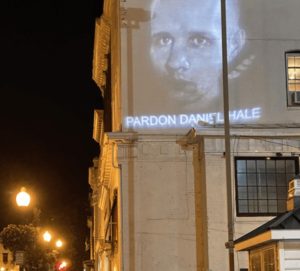Podcast: Play in new window | Download
Source For The Intercept Outed, Faces 10 Years In Prison
In 2019 the Department of Justice indicted Daniel Hale—a former intelligence analyst for the U.S. Air Force and NSA—for giving classified national defense information to Jeremy Scahill for the online publication The Intercept. The events in question took place between 2013 and 2015. In late March, Daniel pleaded guilty to one count of violating the Espionage Act, punishable by up to 10 years in prison. He is scheduled to be sentenced by U.S. District Judge Liam O’Grady on July 27, 2021.
Hale was named as the source of several documents that revealed grave government wrong-doing, much related to the Obama administration’s expansion of the drone war and other counterterrorism programs that lacked adequate oversight and have brought about as yet unknown numbers of civilian deaths abroad. One document published in the Intercept in 2014 revealed that most of the individuals in the government’s terror suspect database had no affiliation with any terror group.
Many have criticized the Intercept for its failure of source protection. As we recently covered in an interview with Reality Winner’s attorney, The Intercept’s lapses resulted in her identifying information being shared by the Intercept with the government.
Guest – William Neuheisel, the Development and Program Manager for the Whistleblower and Source Protection Program, (WHISPeR), at ExposeFacts. William brings nearly a decade of marketing, communications, and development experience to WHISPeR as well as an expertise and passion for privacy, civil liberties, and First Amendment advocacy.
—-
Aerial Investigation Research Pilot Program And Persistent Tracking
As the nation erupts in protests against racially-infused police violence, the Baltimore Police Department has just launched a six-month, day-time aerial surveillance experiment. A Texas billionaire has funded the project that is being operated by an Ohio-based company, Persistent Surveillance Systems. The plane flies overhead and records the movements of everyone in the city.
Michael Harrison, Baltimore Police Commissioner, has justified the nearly $4 million experiment by saying, “There is no expectation of privacy on a public street, a sidewalk.”
The Aerial Investigation Research Pilot Program is, by contract, limited to monitoring such felony crimes as robberies, car jackings, shootings and homicides. Images recorded are, in theory, to be used solely in criminal investigations and will be stored for 45 days. A first prong of the program was conducted covertly in 2016 under a different police commissioner.
The ACLU of Maryland calls this initiative the most comprehensive surveillance of a U.S. city in history. ACLU Senior Staff attorney David Rocah said, “It’s the virtual equivalent of having a police officer follow a resident every time they walk out the door, and if that happened in real life, all of us would understand the huge privacy implications in doing that.”
Guest – ACLU Senior Staff attorney David Rocah has worked on a number of significant cases involving free speech, police misconduct, privacy, election law and more. In 2011 he was an inaugural recipient of the James Baldwin Medal for Civil Rights. David previously worked as a Senior Trial attorney in the Civil Rights Division at the US Dept of Justice, focusing on police misconduct and conditions in prisons, jails and other state institutions.
—————————————-




